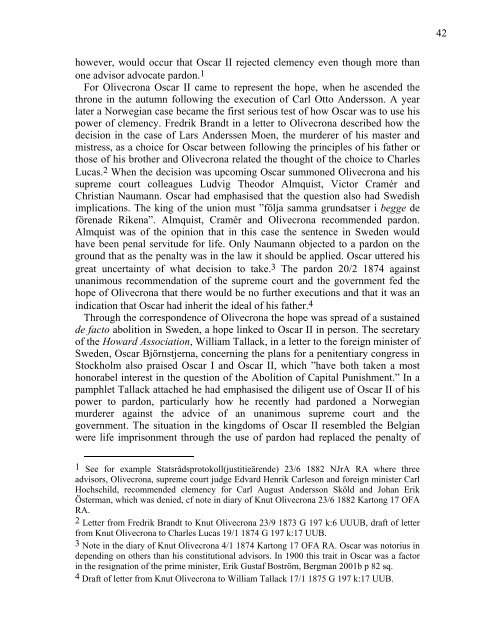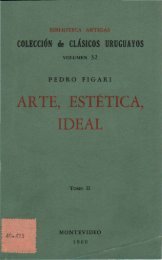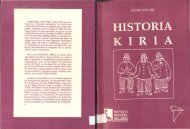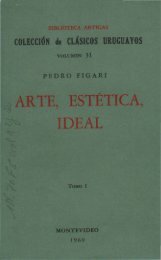Knut Olivecrona and his ”Om dödsstraffet”. - Figuras
Knut Olivecrona and his ”Om dödsstraffet”. - Figuras
Knut Olivecrona and his ”Om dödsstraffet”. - Figuras
Create successful ePaper yourself
Turn your PDF publications into a flip-book with our unique Google optimized e-Paper software.
however, would occur that Oscar II rejected clemency even though more than<br />
one advisor advocate pardon.1<br />
For <strong>Olivecrona</strong> Oscar II came to represent the hope, when he ascended the<br />
throne in the autumn following the execution of Carl Otto Andersson. A year<br />
later a Norwegian case became the first serious test of how Oscar was to use <strong>his</strong><br />
power of clemency. Fredrik Br<strong>and</strong>t in a letter to <strong>Olivecrona</strong> described how the<br />
decision in the case of Lars Anderssen Moen, the murderer of <strong>his</strong> master <strong>and</strong><br />
mistress, as a choice for Oscar between following the principles of <strong>his</strong> father or<br />
those of <strong>his</strong> brother <strong>and</strong> <strong>Olivecrona</strong> related the thought of the choice to Charles<br />
Lucas.2 When the decision was upcoming Oscar summoned <strong>Olivecrona</strong> <strong>and</strong> <strong>his</strong><br />
supreme court colleagues Ludvig Theodor Almquist, Victor Cramér <strong>and</strong><br />
Christian Naumann. Oscar had emphasised that the question also had Swedish<br />
implications. The king of the union must ”följa samma grundsatser i begge de<br />
förenade Rikena”. Almquist, Cramér <strong>and</strong> <strong>Olivecrona</strong> recommended pardon.<br />
Almquist was of the opinion that in t<strong>his</strong> case the sentence in Sweden would<br />
have been penal servitude for life. Only Naumann objected to a pardon on the<br />
ground that as the penalty was in the law it should be applied. Oscar uttered <strong>his</strong><br />
great uncertainty of what decision to take.3 The pardon 20/2 1874 against<br />
unanimous recommendation of the supreme court <strong>and</strong> the government fed the<br />
hope of <strong>Olivecrona</strong> that there would be no further executions <strong>and</strong> that it was an<br />
indication that Oscar had inherit the ideal of <strong>his</strong> father.4<br />
Through the correspondence of <strong>Olivecrona</strong> the hope was spread of a sustained<br />
de facto abolition in Sweden, a hope linked to Oscar II in person. The secretary<br />
of the Howard Association, William Tallack, in a letter to the foreign minister of<br />
Sweden, Oscar Björnstjerna, concerning the plans for a penitentiary congress in<br />
Stockholm also praised Oscar I <strong>and</strong> Oscar II, which ”have both taken a most<br />
honorabel interest in the question of the Abolition of Capital Punishment.” In a<br />
pamphlet Tallack attached he had emphasised the diligent use of Oscar II of <strong>his</strong><br />
power to pardon, particularly how he recently had pardoned a Norwegian<br />
murderer against the advice of an unanimous supreme court <strong>and</strong> the<br />
government. The situation in the kingdoms of Oscar II resembled the Belgian<br />
were life imprisonment through the use of pardon had replaced the penalty of<br />
1 See for example Statsrådsprotokoll(justitieärende) 23/6 1882 NJrA RA where three<br />
advisors, <strong>Olivecrona</strong>, supreme court judge Edvard Henrik Carleson <strong>and</strong> foreign minister Carl<br />
Hochschild, recommended clemency for Carl August Andersson Sköld <strong>and</strong> Johan Erik<br />
Österman, which was denied, cf note in diary of <strong>Knut</strong> <strong>Olivecrona</strong> 23/6 1882 Kartong 17 OFA<br />
RA.<br />
2 Letter from Fredrik Br<strong>and</strong>t to <strong>Knut</strong> <strong>Olivecrona</strong> 23/9 1873 G 197 k:6 UUUB, draft of letter<br />
from <strong>Knut</strong> <strong>Olivecrona</strong> to Charles Lucas 19/1 1874 G 197 k:17 UUB.<br />
3 Note in the diary of <strong>Knut</strong> <strong>Olivecrona</strong> 4/1 1874 Kartong 17 OFA RA. Oscar was notorius in<br />
depending on others than <strong>his</strong> constitutional advisors. In 1900 t<strong>his</strong> trait in Oscar was a factor<br />
in the resignation of the prime minister, Erik Gustaf Boström, Bergman 2001b p 82 sq.<br />
4 Draft of letter from <strong>Knut</strong> <strong>Olivecrona</strong> to William Tallack 17/1 1875 G 197 k:17 UUB.<br />
42






